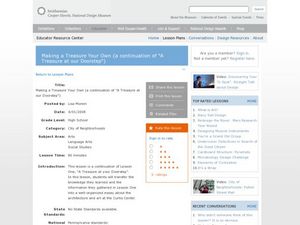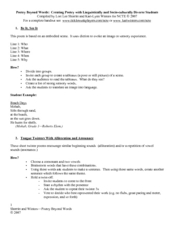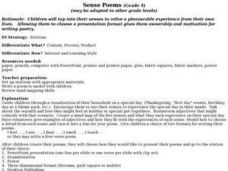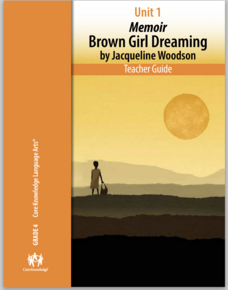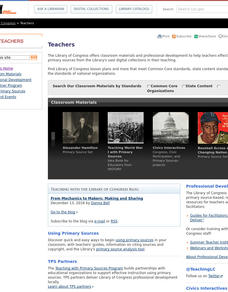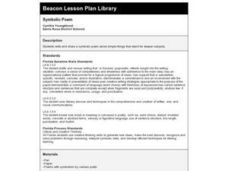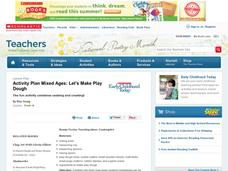Curated OER
Adjectives - Definition and Sentence Completion
In this grammar activity, 3rd graders read the definition of adjectives at the top of the page. They fill in the blank in each of 5 sentences using one of the adjectives from the list at the end of each sentence.
Curated OER
Making a Treasure Your Own: Lesson Two
High schoolers write an essay describing the Curtis Center and what they learned there. In this descriptive writing essay, students discuss the five paragraph essay and review sensory discoveries from their trip. High schoolers draft an...
Curated OER
Poetry Beyond Words: Creating Poetry with Linguistically Diverse Students
Models of and directions for how to write 20 different types of poems are featured in an NCTE resource. The introduction to each form highlights the embedded concepts. For example, tongue twisters encourage poets to use alliteration and...
Curated OER
A Garden of Verses: Poems About Class Gardens
Young scholars explore botany by participating in a language arts activity. For this garden poetry lesson, students read the classic poem "Mary, Mary Quite Contrary" and discuss the imagery and rhyming methods used. Young scholars...
Curated OER
What's On Your Plate?
Students explore the use of sensory details in writing. In this journal writing lesson, students write four journal entries after group discussion about a variety of topics such as their weekend, poverty in the United States, and...
Curated OER
All Quiet On The Western Front
Students create a poem on the subject of war. In this All Quiet on the Western Front lesson, students create poetry using phrases or lines that they brainstorm during a pre-writing session. Students enhance their poetry with sensory...
Curated OER
Flying Freudian Fun: A Look At Ethical Decision Making
There are not many more apt examples of ethics gone awry than William Golding's Lord of the Flies.. Ninth graders focus the ethics of decision making with the examples provided in the plot. They focus on the concept of the psyche and how...
Curated OER
Oliver Twist Goes to Hollywood
How does Oliver Twist, the novel written by Charles Dickens, compare with its screenplay adaptation? Although the activity doesn't require learners to have read the novel, the similarities and differences of the highlighted passages...
Curated OER
The Princess's Point of View
Everyone wants to be part of a royal family. Let your pupils experience the privilege of royalty by rewriting the story The Frog Prince from the point of view of the princess. While the story line remains the same, perspective is bound...
Curated OER
Identifying Setting: Expository Writing
Your class can take turns describing a well know location or setting without giving its name, and the rest of the class can try to identify the location, based on the details given. They chart the elements that helped in the...
Curated OER
Sense Poems
Students explore 5 senses poetry. In this poetry writing lesson, students visualize a special day and brainstorm related vivid adjectives and phrases. Students create mindmaps of the five senses to go with their visualization and write...
Curated OER
Explore Literary Devices in Popular Lyrics
Bring literary devices to life by listening to popular song clips and studying their lyrics.
Core Knowledge Foundation
Unit 1: Memoir - Brown Girl Dreaming by Jacqueline Woodson
The memoir, Brown Girl Dreaming by Jacqueline Woodson, is the focus of a unit designed for fourth graders. Scholars begin each lesson with a warm-up, then listen to a read-aloud of a section of the book. Pupils complete word work,...
Curated OER
Jabberwocky-Identifying Adjectives
Elementary learners identify adjectives in sentences. They read the poem "Jabberwocky" by Lewis Carroll and highlight the adjectives. A good supplemental lesson if you are studying Lewis Carroll and/or "Jabberwocky."
Curated OER
Prairie Senses
Second graders use their senses to explore a prairie or imaginary prairie. They draw pictures to represent the five senses and discover how an artist describes non-visual sensations in a visual way.
Curated OER
Poetry and Nature
Students observe an object in nature and record them. In groups, they create a group poem about the same object. They create their own poem based on another object using other their senses to help them. They share their poems with the...
Curated OER
The New Deal: North Carolina's Reconstruction
Eighth graders study North Carolina's reconstruction through an interdisciplinary project that emcompasses social studies, language arts, visual art, music, and technology.
Curated OER
Symbolic Poem
High schoolers read and analyze several highly symbolic poems. They create their own symbolic poem, read it to the class, and discuss whether they can guess any hidden meanings.
Curated OER
See and Hear T-Graph
In this brainstorming worksheet, students brainstorm for a topic to write about using the graphic organizer. Students then list what they would see or hear for the topic.
Curated OER
Narrative vs. Expository Texts
Young scholars use examples of narrative and expository text to analyze and compare the two styles. Students read articles on life in Lesotho and Madagascar and use graphic organizers and discussion to compare them. Young scholars write...
Curated OER
Let's Make Play Dough
Students create their own play dough to use for art projects. In this art lesson, students measure, pour and mix the ingredients to make their own play dough. Then, students use the clay to create their own sculptures.
Curated OER
Irish Eyes: Taking a Look at Local Landscape
Students create landscape flyers of local landscapes using digital photography, educational software, and examples of Irish landscapes. This creative-project lesson lasts two weeks, including class time spent collecting photographs...
Curated OER
Oliver/Kenyon
Young scholars, through two pieces of writing, identify poetic/language devices through the speakers, personification , imagery, metaphor, etc. They assess the patterns those devices are used in and analyze the theme of each. Each...
Curated OER
Georgia Performance Standards Framework for ELA Unit 6-8th grade
Eighth graders explore figurative language through the study of picture books. In this figurative language lesson, 8th graders listen to books and chart the figurative language that they hear. Students discuss examples in groups.



